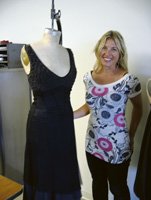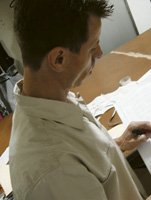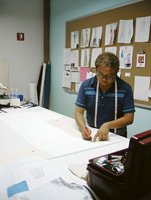The Evans Group: Global Initiative, Local Results
Contractor finds growth among L.A.’s designers—and workers from the international community.
Later this summer, five trained tailors from Senegal will arrive in Los Angeles to participate in a pilot program to employ guest workers in a local contracting shop, The Evans Group.
The program is part of a partnership with African nonprofit group the International Union of Concerned Senegalese and Fashion Business Inc., which will provide business- and English-language training for the workers once they arrive. If the program shows promise, there are an additional 15 Senegalese workers ready to participate in the second round.
And even before the Senegalese workers arrive, The Evans Group is looking in Los Angeles to hire more sewers to help the company produce samples and production for a clientele that includes many California-based young designer and contemporary brands.
The guest-worker program is just one of several expansion plans underway at The Evans Group, the Los Angeles contracting shop started by Jennifer Evans.
Recently, the company began receiving inquires for contracting work from San Francisco and Chicago, prompting Evans to consider opening up satellite offices in both cities to handle the demand for sample-making. And plans are underway to renovate the company’s headquarters to carve out retail space where The Evans Group’s customers could sell their samples. Evans is also on the lookout for a new facility to house training and the production sewing portion of her business. She hopes to find a new space before the end of the year. The move will free up more space to expand the company’s growing development side of the business.
All this growth comes at a time when many apparel manufacturers are looking to shift more and more production overseas. But The Evans Group is part of a coterie of small contracting shops opening up in Southern California to take advantage of the need for local, high-end production for the region’s growing design community.
Evans said her company’s non-stop workload has kept her largely unaware of many competing contracting shops. Still, when pressed, she points to her company’s comprehensive offerings of services as The Evans Group’s point of difference.
“We do everything here,” said Evans. “You can literally pull into a parking spot, drop everything off and come back in six weeks, and everything is done.”
Rapid rise
Evans founded her small contracting company in late 2004, the year before quotas were eliminated on Chinese imports to the United States.
Prompted by a desire to help create jobs in Southern California, Evans first planned to train future production workers by opening a small contracting facility in a school. Instead, the industry novice set up shop with three employees in a small facility in Laguna Beach, Calif.
Two and a half years later, The Evans Group employs nearly 30 people who work out of a 3,000-square-foot facility in downtown Los Angeles. With a team that includes samplemakers, sewers, patternmakers, cutters and a production manager, the company is producing apparel for many of California’s best-known avant-garde designers, including Jeremy Scott, Grey Ant, Society for Rational Dress and “Project Runway” winner Jeffrey Sebelia’s Cosa Nostra label, as well as newer labels such as Aristocracy and Nicky Hilton’s new collection, Nicholai.
Evans’ three original employees—patternmaker Gery Petrov, production manager Delfina Maldanado and cutter Alberto Huerta—are still with the company, and Alexis Monsanto was hired as a second patternmaker last year.
“That’s how we started—by creating jobs for people, finding craftsmen and looking for people who have that drive and those skills,” Evans said, noting that Petrov’s area of expertise is tailored clothing, while Monsanto’s is draping and knits, and Huerta owned his own cutting service before he joined The Evans Group.
Full-Service
While The Evans Group offers everything from sample making to production sewing, the company recommends full service from sample development to final product.
“A lot of our development customers come to us because we also do production,” said Evans. “Because by the time it goes into production, we have a strong understanding of the garment.”
Evans’ customers range from rookies just starting out to seasoned industry veterans.
“Some of our customers draw on a napkin, and others come in with a computer pattern,” she said.
For some new designers, Evans’ team will develop the initial block pattern in order to ensure consistent fit throughout the entire collection.
“We’ve had to take it a few steps back and go from there—it really helps them.”
For customers that do decide to start from the beginning, The Evans Group will create a block, or sloper, then create the patterns, cut and sew samples in muslin or a material similar to the production fabric, have a fitting and make adjustments to the patterns, and then sew the samples out of the production yardage.
For production, Evans’ team will inspect and adjust the patterns, grade them and make a marker by hand, rather than computer. While Evans insists she’s not opposed to computer-aided design, she notes that the complexity of some of her clients’ designs requires a hands-on approach.
“It’s a new concept to go from start to finish for these designers,” said Evans. “They’re used to doing it all on their own and running around town.”
That’s the case for Alessandro Tomassetti and Alon Rosenfeld, partners in the Los Angeles boutique All Purpose and menswear line Filius.
“We’re a small operation, and one of us wasn’t available to run around downtown to coordinate everything,” said Tomassetti, designer of the collection. “Being that this is the beginning of a new business, we wanted to be as streamlined as possible.”
The Evans Group just completed a second season for Filius, Tomassetti said, noting that Evans’ other clientele were “on par with the quality that we do.” Plus, Petrov’s tailoring skill and knowledge of the men’s business were added incentives.
“They have some really smart, skilled people there. It was a natural choice,” he said, adding, “We are committed to keeping things local, and it’s great that Jennifer is making an effort to provide an environment for workers that keeps them around. That consistency is key.”
Teamwork is Everything
It takes The Evans Group about four to six weeks to develop a collection of 15 to 20 pieces—“if we do a muslin and have a fitting,” Evans said.
Orders can run from one piece to 300, although orders for fewer than 20 pieces are considered a sample, and typical production orders run between 20 and 200 pieces per style.
“We don’t like to take really large jobs—it takes up our whole factory,” Evans said.
But because many orders are small, employees must have the skills to switch between jobs throughout the day.
“Because we’re small, we have to find people who can sew anything,” Evans said. “We have people who are good with wovens and others who are good with Lycra, but we need them to be able to do everything. It’s not easy when you have to change the thread every hour. It’s a different ballgame than with regular production.”
To ensure smooth production, Evans has instituted a policy of delivering finished production six weeks from the time all the components are received, noting that if the fabric or a trim is late, the job moves to the back of the line.
“We don’t have big and small customers—it’s first come, first served,” Petrov said. “We don’t rush the job.”
The policy is one of several that Evans holds firm.
“We’ve worked hard this season to have really excellent production timing without many problems because of this [policy],” she said, adding that she won’t haggle over prices and if customers bring in their owner patterns, Petrov or Monsanto will inspect them before cutting to make sure enough fabric and trim has been ordered.
“The whole reason is to give them good service so they’re happy,” Evans said. “My first year, it was hell—we spent a lot of time learning how to do it. This year, we’re having fun and getting lots of thank-you notes.”
For more information on The Evans Group, call (213) 626- 4377 or visit http://evansgroupinternational.com.
Training Day
The Evans Group recently received Employment Training Program (ETP) funding from the state of California, which will help offset costs for current courses in English and Worksite Wellness offered to company employees. (The company also offers employees Illustrator and Web PDM courses though Fashion Business Inc.)
The Evans Group takes advantage of several state and local programs available to small businesses. The company’s headquarters is in a building located in one of Los Angeles’ enterprise zones, which entitles The Evans Group to several tax and business benefits, such as rebates on utility bills.
The small contracting company learned about the ETP funding though the Los Angeles County Economic Development Corp., which also directed The Evans Group to pursue certain tax-credit initiatives such as Welfare to Work and utility programs through the Department of Water and Power.
It’s all part of The Evans Group’s mission, said founder Jennifer Evans.
“Besides nurturing design in L.A., we want to create a workplace where people can learn and improve their skills to improve their salaries and, ultimately, their quality of life,” she said.
























